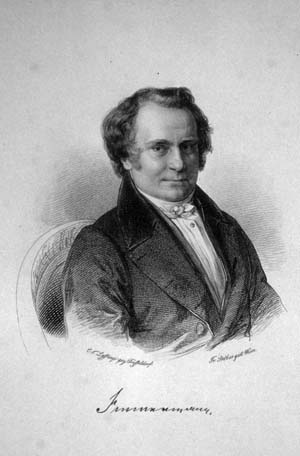The Student of Prague
Karl Immermann
Translated by J. C. Mangan
WHAT riotous din is ringing?
What wassailers throng the house?
The Student of Prague is singing
The praise of his wild carouse.
With bloodshot eyes and glowing,
He shouts like one possessed,
His goblet overflowing,
His head on his leman’s breast.
As pallid as alabaster,
The servant ventures in:
“’T is midnight, O my master!
Cease now, at least, from sin!”
“Avaunt, thou croaking booby!
I brook no babble from thee;
As long as the wine looks ruby
Right jovial I swear to be!”
He drinks from his goblet faster;
Within lies a coiléd worm:
“God gives thee a sign, my master,
It saith, Repent! Reform!”
“Truce, dolt, to thy coffin-faces!
Go, preach to the fools that will hear;
Thus locked in my leman’s embraces,
What accident have I to fear?”
He plays with her night-black tresses;
She breaks from his arms by force;
Her hand on her heart she presses;
She shrieks, and drops down a corse!
Then steps the servant past her,
And falls upon his knee:
“God shows thee a sign, O master,
A fearful sign to thee!”
“Away, thou hound, to the Devil!
Red gold have I still in store
To win me wherewith to revel,
And fairer lemans a score.
So long as my dotard father
Takes care of this purse of mine,
So long, by hell, will I gather
The roses of love and wine.”
The servant, shuddering, fetches
Away the accusing dead;
And the wild young student stretches
His wasted limbs in bed.
The lurid lamp is shooting
A bluer glare anon;
The owls without are hooting;
The hollow bell tolls “One!”
When lo! a charnel vapor
Pervades the student’s room;
Then dies the darkening taper,
And, shimmering through the gloom,
A shadow with look of sorrow
Bends over the reckless boy,
Who dreams of new pleasures to-morrow,
And laughs his libertine joy.
The pitying phantom raises
Its warning hand on high;
The student starts; he gazes;
He grasps his bed-sword nigh;
He strikes at what resembles
His father’s features pale,
And the stricken phantom trembles,
And vanishes with a wail.
The wintry morn is dawning
In ashy-gray and red;
The servant undraws the awning
That screens his master’s bed;
And a black-edged letter, weeping,
He gives the startled youth;
And the student’s flesh is creeping,
For he fears the dreadful truth.
“From thy mother, broken-hearted,
And widowed now by thee,
Thy father has departed
This life in agony.
Whole nights I saw him languish;
And still he called in wild
And ceaseless tones of anguish
For thee, his ruined child.
“At last he lay as trancéd;
His struggles appeared to cease,
And I fondly hoped and fancied
His spirit was now at peace;
But soon I heard him crying,
‘He strikes me with his sword!’
And his bitter curse in dying
On his hardened son was poured.”
The parricide student ponders,
But word he utters not;
He leaves the house and wanders
To a lone and desolate spot.
With scissors he there divests his
Proud head of its clustering hair,
And low on his hands he rests his
Shorn skull and temples bare.
And now what chant funereal,
What feasters, fill the house?
Their chant is a dirge of burial,
Their feast a death-carouse.
They drain the funeral-bowl off,
And chorus in accents vague
A hymn to the rest of the soul of
The penitent Student of Prague.
